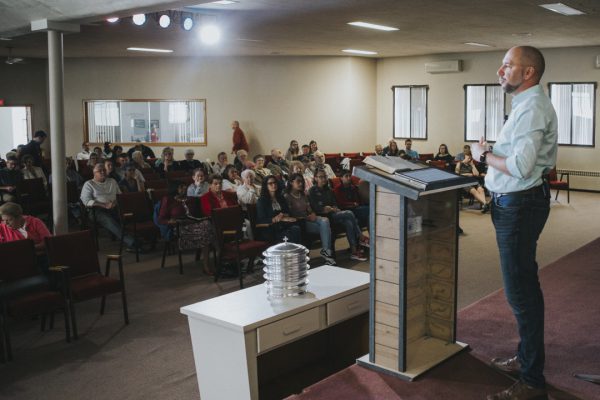One slogan that captures the spirit of the age is “my body my choice.” The belief that our body belongs to us, and we can do with it as we please, is behind abortion, transgenderism, and all manner of sexual immorality. But this is not an idea that began with the sexual revolution of the 1960s. This idea is as old as sin itself and was widespread in Corinth, eventually making its way into the church at Corinth as well
In 1 Corinthians 6:9-11 Paul condemned moral actions that destroy our relationship with God and one another, insisting that those who practice such things will not inherit the kingdom of God. In vv.12-20 Paul’s point is simple: sexual immorality is inconsistent with God’s design for the body. We have been united to Christ, incorporated into his body, and the Christian life is a life of obedience carried out in our bodies. Therefore, what we do with our bodies matters. Paul gives four reasons why. In part 1 we’ll see that our bodies are destined for resurrection and designed for union with Christ. In part 2, we’ll see that our bodies are defiled by sexual immorality and a dwelling for the Holy Spirit.
Your Body Destined for Resurrection
“All things are lawful for me,” but not all things are helpful. “All things are lawful for me,” but I will not be dominated by anything. “Food is meant for the stomach and the stomach for food—and God will destroy both one and the other.” The body is not meant for sexual immorality, but for the Lord, and the Lord for the body. And God raised the Lord and will also raise us up by his power (1 Cor. 6:12-14)
In verse 12 Paul addresses the Corinthian excuses for sexual immorality by quoting what is likely a slogan of the Corinthians themselves. He makes the point that Christian behavior is not based on whether or not you simply have the “right” to do something, but whether your conduct is good, profitable, and edifying to others (1 Cor. 10:23). Paul adds that there is a danger of being mastered or esnalved by something that is permitted (1 Cor. 6:12). But Christian freedom is not to be used for anarchy but for serving one another through love (Gal. 5:13; 1 Pet. 2:16). Christian freedom means being free to not take orders from our appetites or the culture.
In verse 13 Paul quotes the Corinthians again, but scholars divide over where the quote ends (since quotation marks are not in the original Greek text). The ESV takes the quote to be “food is meant for the stomach, and the stomach for food,” with Paul’s response being, “and God will destroy both one and the other.” But that seems completely at odds with Paul’s eschatology and what he is about to argue. Instead, it seems best to take the Corinthian slogan as, “Food is meant for the stomach, and the stomach for food, and God will destroy both one and the other.” The idea would be this: just like food is made for the stomach, so sex is made for the body. They are both merely appetites we can satisfy whenever or however we want. And since God is going to destroy food and the body, it doesn’t matter what we do with it, which sounds alot like gnostic thinking.
Understanding the quote this way makes Paul’s response match it perfectly: “[but] the body is not meant for sexual immorality but for the Lord, and the Lord for the body. And God raised the Lord and will also raise us up by his power” (1 Cor. 6:13-14). Sexual appetites, though good and given by God, are not to drive how we use our bodies. So, what is the body for? Not just what, but who. Our bodies are for the Lord and are destined for resurrection, and the resurrection of the Lord Jesus Christ is the proof.
Our relationship to Jesus is not simply spiritual, but physical. Our bodies are essential to who we are. That’s why we intuitively know that things like physical and sexual abuse happen to us, not just our body. So, saying, “the body belongs to the Lord” means we belong to him, and saying that “that the body will be raised” means we will be raised. This gives meaning and responsibility to our bodily lives now. Our future reality in Christ should determine how we live in the present (Rom. 12:1).
Your Body Designed for Union with Christ
Do you not know that your bodies are members of Christ? Shall I then take the members of Christ and make them members of a prostitute? Never! Or do you not know that he who is joined to a prostitute becomes one body with her? For, as it is written, “The two will become one flesh.” But he who is joined to the Lord becomes one spirit with him (1 Cor. 6:15-17)
In these verses Paul takes his principle (the body is for the Lord) and applies to the specific situation of going to prostitutes. He uses two more “do you not know” questions to correct their thinking and provide a theological reason why sexual immorality of any kind is wrong (1 Cor. 6:18).
Paul begins with the claim “your bodies are members of Christ” (1 Cor. 6:15). Not only are we members of Christ’s body in a spiritual sense (1 Cor. 12:12), but also in a physical sense (cf. Acts 9, “Saul, why are you persecuting me?”). This is what the famous first answer in the Heidelberg Catechism affirms: “I am not my own, but belong with body and soul…to my faithful Savior Jesus Christ.” Paul then uses this metaphor/image of being members of Christ and applies it to sexual immorality: “Shall I then, take the members of Christ and make the members of a prostitute? Never!” If our bodies are joined to Christ, as members of his body, then we cannot be joined to a prostitute. That immoral sexual union mysteriously and metaphorically damages Christ. To sin in this fashion, is like tearing off Christ’s limb and forcing Christ to be united to a prostitute.
Then Paul unpacks what he just said with another question “Or do you not know that he who is joined to a prostitute becomes one body with her? For, as it is written, “The two will become one flesh” (1 Cor. 6:16). This verb “joined” is used by Jesus when he says a man leaves his father and mother and “holds fast” to his wife. He is “welded” or “glued” to her, and they become one flesh. Paul quotes Genesis 2:24 as the reason why. You become one body with a prostitute because God set it up this way and said so. Paul is not claiming that sex with a prostitute (or any fornication) automatically constitutes a marriage (marriage is more than just sex). Rather, he’s using this verse to show the seriousness of sex and the strong bond it creates between two people. Remember, he’s reminding the Corinthians of the importance of the body, and dismantling their idea that what they do with their bodies doesn’t matter. Quoting Genesis 2:24 shows how they are distorting the original intention of marriage and what means to be members of Christ’s body.
Now, in a parallel sentence to v.16, Paul further clarifies that the believer is not joined to Christ in a physical/sexual union, but spiritually: “But he who is joined to the Lord becomes one spirit with him” (1 Cor. 6:17). This doesn’t mean Paul doesn’t care about the body (vv.18-20 make that even clearer), but provides clarification to Paul’s main point: we cannot be united to a prostitute because we (body and soul) are united to Christ by his Holy Spirit. This is a lesser to greater idea. If we are united and one flesh with our spouses and ought not commit adultery, those who are united to Christ by the Spirit ought not commit spiritual adultery/idolatry of any kind either.
Conclusion
Why is sexual immorality off limits in God’s kingdom? Because our bodies are for the Lord and are destined for resurrection and designed for union with Christ. Sexual immorality, with a prostitute or anyone else (all adultery and fornication) should conjure up the image of a broken “nuptial” relationship with the Lord. We are united to Christ as his bride, and for his bride to sin by being united to someone else is to be guilty of spiritual adultery. That’s why Israel’s sin in the OT is likened to harlotry time and time again, which is another reason why Paul probably says, “do you not know?!”
The body matters. God gave us bodies; God took on flesh himself! And as Christians, we use our bodies, that are united to Christ and will be raised in resurrection power, to glorify the Lord and represent him in his world.




